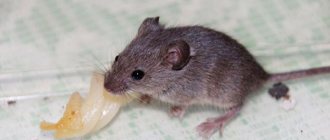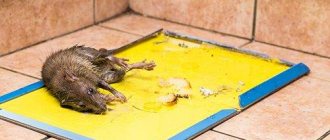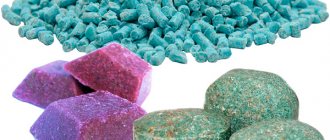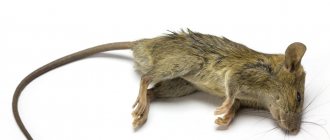As soon as we allow them, they willingly make nests in our houses, feed on the rest of the food, wander around the corners, and are not easy to catch and throw away. Mice and rats can become permanent, unwanted tenants on your property. So how do you fight them? Luckily, there are a few methods that these rodents don't have a chance at.
Prevention is better than cure
In almost all areas of life, prevention is extremely important. It is better to avoid a problem in advance and minimize the likelihood of its occurrence than to struggle for a long time and look for solutions. The situation is similar to the presence of rodents in our homes. There are a number of circumstances whose appearance in the household effectively repels mice and rats.
Here are some of them:
- cats and mice do not like each other, they avoid their company for centuries, because for these small animals it can end tragically. Even now, when owners pamper cats and they do not have enough food, their very presence and smell are effective in repelling rodents;
- order - both mice and rats must have food from which they can establish themselves in the environment. These rodents feed on leftover food, even spoiled food, so leaving unfinished meals or unprotected waste is a real draw. So if we want to avoid annoying little tenants, let's keep our kitchen tidy, keep food in the refrigerator, and don't leave dirty dishes or leftovers in the sink. We also properly secure municipal waste and maintain order throughout the apartment. Pure house mice just don't like it;
- “airtight” interior – these little rodents enter homes through tiny cracks that we may not even notice every day. Therefore, to protect yourself from the horror of a mouse, it is best to thoroughly check the entire house, not just the first floor, because climbing the wall is not a problem for rodents. Critical points are usually where the planks meet the floor, around the roof, installation connections (eg central heating) or other pipes that pass through the wall of the house. If we find even a small defect, it must be tightly closed (for example, using ordinary plaster);
- herbs - odors that mice and rats really don’t like are emitted by some herbs, such as: mint, lavender, tansy, mullet, wild chamomile. Placing this type of grass in your home can deter rodents and keep them away.
Danger from earth rats
This rodent is the largest of the family of vole mice to which it belongs: its body can be 110-260 mm long. This mammal is called the water rat, and its natural habitat is river and lake banks, but the rat also lives in vegetable gardens.
Pests dig underground passages in the ground and make holes for themselves, and along the way they eat the roots of garden crops. They can live in groups and can leave you without a harvest. Rodents eat:
- roots;
- root vegetables;
- cereals.
In addition, these parasites eat flower crops and fruits. They are able to multiply quickly and rarely appear on the surface, so they are very difficult to destroy.
Rat. (Photo used under standard license ©ogorodnye-shpargalki.ru)
Mouse grass
Plants that can be used dry and fresh are effective and efficient means of pest control. Folk remedies for mice in a private home are safe, taking into account the specifics of use.
The most popular plants are:
- Coriander is rich in essential oils and you can take the stems or the seeds.
- Not only for beauty, but also for pest control, you can use chamomile, calendula and daffodils.
- Toxic substances are found on the tops of tomatoes, which need to be chopped and distributed in a private home.
- You can repel intruders with drugs and slowly use flowers and stems with leaves.
Wormwood for mice at home
This plant is also known as bitter herb because it has a bitter aroma. Even in ancient times, wormwood was planted around the perimeter of the garden to protect it from attacks by various pests. Sheaves of bread are also placed on dried plants to protect themselves from rodents. Place mouse wormwood in places where dangerous animals could be seen.
Black medicinal root
For a long time, this plant has also been called rat plant because it is most effective in controlling rodents. Can be used both fresh and dry. To make baits to get rid of uninvited guests in a private home, dried rhizome powder, fresh juice and strong broth are used. You can simply spread the grass around the room, which will repel pests. An effective home remedy for mice is resistant seeds that stick to the skin and cannot be removed by any means. Remember that the root and seeds of the plant are poisonous.
Black elderberry for mice
The highest concentration of substances harmful to animals in this poisonous plant is found in the roots. Black elderberry contains hydrocyanic acid, which is a deadly poison. Shrubs have a pungent and easily noticeable aroma, which causes a feeling of fear in rodents, forcing them to leave the house.
An effective mouse repellent is used in several ways: by placing branches in different areas where the animals have appeared, or by spraying them with elderberry broth or essential oils. In a private home, use the plant with caution, given the presence of poison.
Tansy
The herb has a camphor-like odor, so it has been used for many years as an insecticide to control various insects. Folk remedies for mice also include tansy, which is very easy to use: tie several shoots with flowers in bunches and place them in a private home. In addition to getting rid of the mouse, ants and flies will leave the room.
Peppermint
Many will be surprised to learn that the pleasant scent of mint is something mice hate for many people. If you are interested in how to get rid of mice in a private house with mint, then pay attention to the following methods:
- The easiest option is to use the plant in dry and fresh form, which should be spread out in different places.
- You can use mouse grass at home as a spray. To do this, boil water and put dried leaves there. Leave covered until it cools and pour into a container with a spray bottle. Spray the spray that shows signs of pest activity.
- To prepare a concentrated product, soak cotton balls in essential oil and leave them in different places in your home.
Ledum from mice
This plant has many essential oils that smell. It is important to make sure that residents of a private home are not allergic to the aroma of wild rosemary.
- This mouse grass should be spread into all corners and openings. Remember that the scent becomes weaker over time, so improve your defenses.
- Planting indoor plants is a good option.
- You can take essential oil and place a few drops of it on a lamp or candle.
- Another option is fumigation of a private house.
The note! Electrical repellents are devices that make specific sounds that are inaudible to humans, but extremely irritating to rodents. This allows mice and rats to avoid places where they feel discomfort.
Ultrasonic repeller
If you do not want to use the means described above, then you can protect your country house from rats using ultrasound-based electrical appliances. They emit waves that are inaudible to humans, but cause panic in rodents. Therefore, those living in the house leave it, and new ones pass by. Among the models, it is recommended to pay attention to Tornado-200, Electro-Cat Turbo, Chiston-2.
When using such a repeller, it should be taken into account that ultrasound propagates only in open space and does not penetrate into adjacent rooms. Therefore, for the winter it is advisable to install one device in each room. Moreover, for such a long time you need to connect them to the power supply, since the batteries will quickly turn off in the cold, and the repeller will cease to perform its functions.
When it's too late for prevention...
In many cases, it happens that it is only when we discover obvious signs of rodents in our home that a brutal confrontation with reality occurs. Suddenly it turns out that mice and rats can breed even in urban homes, not just in rural areas. Bitten food, numerous droppings, cluttered garbage bags or characteristic scratches at night - these symptoms indicate one thing - rodents are already on board.
When prevention can no longer be discussed, concrete steps must be taken. Both mice and rats are animals that nest in new environments; they reproduce easily and quickly, so once they find a comfortable environment, they will not refuse it. Any owner who has experienced the presence of rodents in his home should prepare for a difficult fight, no matter how victorious. To effectively get rid of unwanted guests, you need to know the appropriate methods.
Undoubtedly, lovers of all animals will be inclined towards more humane measures, however, when the problem gets worse, no-compromise solutions should be used.
Less radical methods include:
- Live trap is very easy to make and we can easily make it ourselves. We only need a roll of paper (for example, toilet paper) and a half-meter container with steep sides. A tasty bait (such as a cookie or cracker) is also necessary. A mouse, tempted by a delicious treat, enters a cardboard tunnel, overloads it, and falls into a container from which it cannot escape. In this way, the mouse is caught, but it will not be harmed or lose its life, so we can successfully carry it far into the forest;
- A plastic tunnel is another method that allows you to get rid of a rodent from your home without taking its life. The operating principle is similar to the above case. The mouse or rat enters the tunnel, attracted to a piece of food bait, then the tunnel tilts and snaps shut, trapping the rodent inside.
However, when soft methods fail, you need to take more drastic measures, which include:
- a traditional mousetrap is perhaps the most common method that causes rapid death of rodents. You can use cheese, breakfast meats, smoked meats or other aromatic delicacies as bait, but be sure to include them. This method is intended when rodents in the house have not yet spread, and only isolated individuals are encountered;
- poison - buying such a drug has its supporters, although we should not forget that poison is also harmful to people and other pets. Therefore, in homes with small children, it is better not to take risks and choose another method. Another disadvantage of the poison is the fact that after consuming it, the mouse can end its life somewhere deep under the furniture, and we only become aware of this during the decomposition and strong stench. The solution, however, is to use poison with a mumifactor, which causes the rodent to dry out and blocks tissue destruction. However, in any situation, you must get rid of any remaining poison from your home;
- deratization - when all methods fail, and the problem worsens and becomes extremely annoying, it is worth seeking professional help. Specialized pest control companies provide comprehensive services using chemicals, special poisons or gases. The latter may even require household members to leave the apartment for a certain period of time. Professional companies guarantee efficiency while maintaining all safety measures. Of course, we will have to pay properly for such services, but the price depends on the means used, the size of the house or the number of unwanted tenants.
Expulsion by folk methods
How can you fight rats in your garden using traditional methods? This approach is based on the fact that the earth rat does not like strong and pungent odors. To quickly evict them from your site, you can use the following methods:
- pour water and ash into the holes;
- place rags in the hole, having previously soaked them with fuels and lubricants: gasoline, kerosene, oil, grease;
- pour kerosene on a dead rat carcass, burn it, and then place it at the entrance to the hole (you can also take the skin of a rabbit or other game);
- You can set fire to rubber near the holes so that smoke and fumes penetrate inside.
In addition, you can use plants. These creatures cannot tolerate the smells of wormwood, tansy, chamomile, elderberry, hawthorn, and mint. By the way, plants can be used for prevention purposes. You can plant mint and chamomile among the beds.
How to get rid of a rat
Rats are the second rodent after mice to take up residence in our basements, garages or attics. If they find the right opportunity, they will happily enter the apartment. If we encounter this problem, we must immediately take appropriate measures to protect us from the invasion of these animals. Here's the information you need on how to control rats.
Symptoms of the presence of rats
How do you know that an unwanted guest has settled in our house? If we notice food debris, disturbed food supplies, bitten wires, cables, damaged woodwork or droppings, we can assume that a rat is the culprit. It often happens that we come face to face with a new tenant. Then we are sure that appropriate measures must be taken. Why?
The rats found are large - from 20 to 30 cm plus a tail - and reproduce very quickly. If we allow this, soon the population of these animals in our house will increase to several dozen individuals. Secondly, the rat will not leave the place where it feels good and has food. The source of food for it can be not only our pantry, but also the waste that we throw in buckets, in the yard, etc.
Rats carry parasites and diseases, which is why we need to get rid of them as soon as possible. It is worth starting our activities as soon as possible - it will be easier for us to fight with one or two rodents than with the entire herd, especially since they are smart animals and will quickly learn to avoid traps set for them. Here are the steps we can take to get rid of a rat from our home.
Why are these rodents dangerous?
A rat infestation is tantamount to a major natural disaster. The worst thing is that it is not at all easy to get rid of them. The fight against rats can be lengthy. Rodents such as rats spread numerous diseases that pose a great risk to human health. Salmonellosis, tuberculosis, scabies, and many other dangerous diseases are the work of their paws.
Rats are carriers of fleas and ticks, which in turn can cause various allergic reactions in people, especially children.
Rats can also damage furniture and other things in your home. Their urine and excrement cause corrosion of electrical cables, leading to fires. How to remove rats? How to poison rats, and how to get rid of rats and mice - we will look in detail in this article.
Ways to fight rats
Traps
In traps for rodents (also mice), we leave a treat that lures the attacker. When the animal is tempted and reaches for food, the trap mechanism is activated, which kills the animal. In this case, we will have to get rid of the rodent's corpse, which is not a good duty. Also remember that the placement of traps should be designed so that it not only provides an opportunity to lure a rat, but also does not pose a threat to curious children, dogs or cats, who can activate the trap mechanism just as easily as a rat. It may also happen that smart attackers will not be fooled at all or will very quickly learn to avoid places that are dangerous to them. You can buy traps in stores or make your own. On the market, in addition to mechanisms that kill the pest, we will also find bright traps that allow you to humanely destroy the rodent without touching it. Most of these accessories are reusable.
Poisons
Poisons are agents that cause death in rats after ingestion. They are prepared in such a way that they appear appetizing to them, but in fact contain substances that are lethal to rodents. At the same time, they contain the bitter denatorium benzoate, which will reduce the risk of human consumption. Here, as with traps, it is likely that the poison will also be attractive to our pets, so it should be exposed in areas inaccessible to our pets.
On the market you will find liquid poisons, which we use in drinking bowls or soak them in other baits (for example, bread, fruit), poisons in the form of solid granules attractive to rodents, pastes or cubes. In addition, preparations of this type are enriched with a mummifying substance that prevents decomposition of the animal's body and prevents the release of unpleasant odors. The poisons take effect only after a few days, and thanks to this, other animals do not associate unpleasant effects with the consumption of the product.
Cleaning
Cleaning - professional deratization. If we have not been able to control pests ourselves or simply do not want to deal with them, we can entrust this task to a professional company. Moreover, specialists will not only get rid of rats, but also protect our property from their reappearance. Each company has developed effective methods in this area.
Description of the rat
The rat has a strong body 8–30 cm long, an elongated head with a narrow or wide and blunt muzzle, small eyes and ears, a thick neck and paws.
The long and thick tail makes up 80–100% of the body length. In most species it is bare, covered with scales and sparse vegetation. Black rats have a thicker tail covered with six.
The fur is thick and hard, often sticking out in different directions. Its color is variable and can be gray, gray-brown, dark brown, black-brown, red, red-brown. On the back the fur is darker, and on the belly the shades are lighter.
Animals see poorly, but poor vision is compensated by a good sense of smell and excellent hearing. The weak point of rats is their inability to fast for more than 3-4 days and go without water for more than 2 days.
Rats live alone or in families in burrows, hollows and under tree roots, in the nests of other animals. Within populated areas, pests make their home in the underground and attics of residential and outbuildings; they can live in sewer wells and elevator shafts, in sheds for poultry and livestock. A small hole or crack is enough for rodents to enter there.
The lifespan of rats is 1–2.5 years. Rodents are very prolific. During the year, the female gives birth to 2–3 litters, each of which contains an average of 6–10 rat pups.
Rats have unique physical characteristics: they can jump to a height of 1 m and move along various horizontal and vertical surfaces, swim and dive well. They are able to run a distance of up to 17 km in a day, withstand high radiation, live and reproduce both in the cold (at an air temperature of -20°C) and in heat above 50°C.











